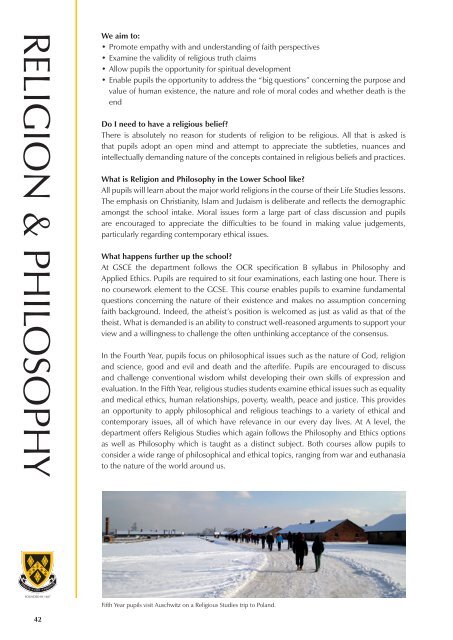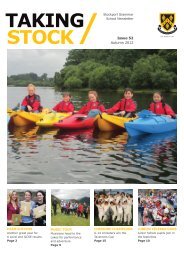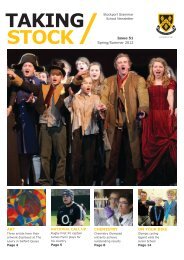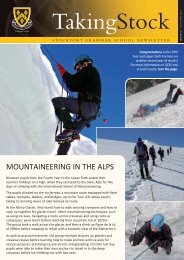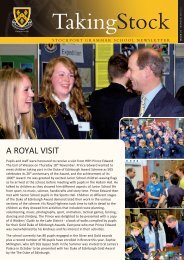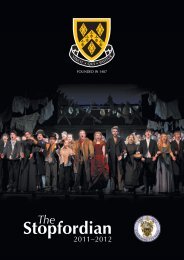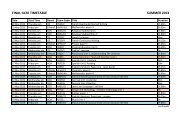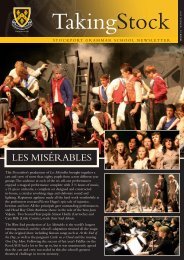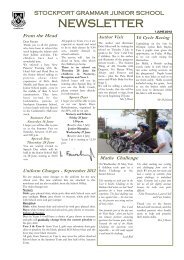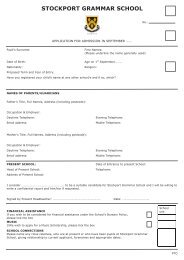Information Book Just for Starters - Stockport Grammar School
Information Book Just for Starters - Stockport Grammar School
Information Book Just for Starters - Stockport Grammar School
You also want an ePaper? Increase the reach of your titles
YUMPU automatically turns print PDFs into web optimized ePapers that Google loves.
RELIGION & PHILOSOPHY<br />
We aim to:<br />
• Promote empathy with and understanding of faith perspectives<br />
• Examine the validity of religious truth claims<br />
• Allow pupils the opportunity <strong>for</strong> spiritual development<br />
• Enable pupils the opportunity to address the “big questions” concerning the purpose and<br />
value of human existence, the nature and role of moral codes and whether death is the<br />
end<br />
Do I need to have a religious belief?<br />
There is absolutely no reason <strong>for</strong> students of religion to be religious. All that is asked is<br />
that pupils adopt an open mind and attempt to appreciate the subtleties, nuances and<br />
intellectually demanding nature of the concepts contained in religious beliefs and practices.<br />
What is Religion and Philosophy in the Lower <strong>School</strong> like?<br />
All pupils will learn about the major world religions in the course of their Life Studies lessons.<br />
The emphasis on Christianity, Islam and Judaism is deliberate and reflects the demographic<br />
amongst the school intake. Moral issues <strong>for</strong>m a large part of class discussion and pupils<br />
are encouraged to appreciate the difficulties to be found in making value judgements,<br />
particularly regarding contemporary ethical issues.<br />
What happens further up the school?<br />
At GSCE the department follows the OCR specification B syllabus in Philosophy and<br />
Applied Ethics. Pupils are required to sit four examinations, each lasting one hour. There is<br />
no coursework element to the GCSE. This course enables pupils to examine fundamental<br />
questions concerning the nature of their existence and makes no assumption concerning<br />
faith background. Indeed, the atheist’s position is welcomed as just as valid as that of the<br />
theist. What is demanded is an ability to construct well-reasoned arguments to support your<br />
view and a willingness to challenge the often unthinking acceptance of the consensus.<br />
In the Fourth Year, pupils focus on philosophical issues such as the nature of God, religion<br />
and science, good and evil and death and the afterlife. Pupils are encouraged to discuss<br />
and challenge conventional wisdom whilst developing their own skills of expression and<br />
evaluation. In the Fifth Year, religious studies students examine ethical issues such as equality<br />
and medical ethics, human relationships, poverty, wealth, peace and justice. This provides<br />
an opportunity to apply philosophical and religious teachings to a variety of ethical and<br />
contemporary issues, all of which have relevance in our every day lives. At A level, the<br />
department offers Religious Studies which again follows the Philosophy and Ethics options<br />
as well as Philosophy which is taught as a distinct subject. Both courses allow pupils to<br />
consider a wide range of philosophical and ethical topics, ranging from war and euthanasia<br />
to the nature of the world around us.<br />
Fifth Year pupils visit Auschwitz on a Religious Studies trip to Poland.<br />
42


